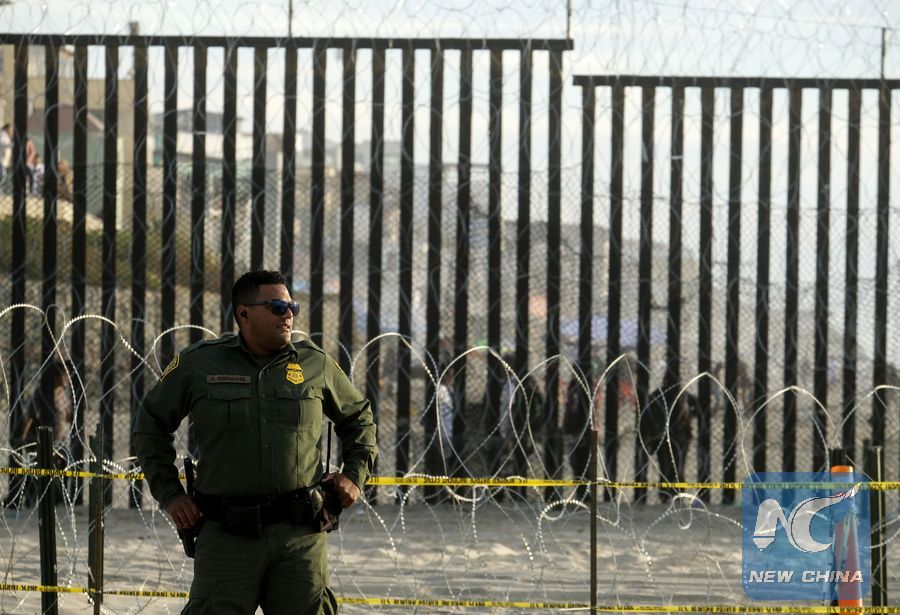
File Photo: A U.S. Border Patrol agent stands in front of the border fence that divides the U.S. and Mexico in San Diego, California, the United States, Nov. 17, 2018. (Xinhua/Zhao Hanrong)
by Matthew Rusling
WASHINGTON, June 6 (Xinhua) -- The United States continued talks with Mexico on Thursday amid U.S. President Donald Trump's threats to slap tariffs on its southern neighbor. If tariffs take effect, that could impact both economies and drive a wedge between Washington and its third largest trading partner, experts said.
At issue is whether Mexico will step up efforts to stop the flow of undocumented migrants crossing its southern border into the United States. Trump has expressed frustration over growing inflow of illegal immigrants. Last month saw a decade-long high in apprehensions of illegal migrants, with 133,000 detained at the border.
Mexico is also used as a route of entry to the United States by violent criminal gangs from El Salvador, such as the infamous MS-13, while many of Trump's supporters also believe that illegal immigration drives down working class wages and increases competition for blue collar jobs.
Illegal immigration will be one of Trump's major platforms in the 2020 elections, and the president believes Mexico has done very little to mitigate the situation. While Mexico on Thursday vowed to provide 6,000 troops to beef up border security, that may not be enough to satisfy Trump's demands.
The U.S. president has threatened that if Mexico does not take action to stem the tsunami of illegal migration, he will slap a 5 percent tariff on Mexican goods that will grow incrementally if no agreement is reached.
Late Thursday afternoon, White House Press Secretary Sarah Sanders said the U.S. "position has not changed, and we are still moving forward with tariffs at this time."
"Trump is using Mexico to highlight the issue of illegal immigration and why there needs to be stronger action taking to reduce it," Brookings Institution Senior Fellow Darrell West told Xinhua.
"He blames Mexico because many Central American asylum-seekers go through Mexico on their way to the United States," West said.
Tori K. Whiting, an economist specializing in trade at the Heritage Foundation, told Xinhua the president's strategy is to coerce Mexico into cooperating more on immigration, but he noted that the tariffs will harm Americans.
REPUBLICANS DISAGREE
While Republicans support Trump on most issues, some GOP lawmakers have parted with the president on the issue of tariffs on Mexico.
Senate Majority Leader Mitch McConnell said Tuesday that "There is not much support in my conference for tariffs, that's for sure."
However, while McConnell is seeking to delay the tariffs, it remains unknown whether there is enough GOP opposition to push back.
Trump's move has "sparked a backlash among a number of Republican legislators who oppose the use of tariffs and fear it will open another trade war south of the border," West said.
OUTDATED LAWS
TV news personality and Republican Strategist Ford O'Connell told Xinhua the main problem is that U.S. laws do not reflect the reality on the ground. The vast majority of illegal migrants are from Guatemala, El Salvador and Honduras. Many are traveling as families, or claiming to be families.
The laws are designed to stop single men from Mexico, rather than families or children migrating alone. Laws make it difficult to detain such individuals, even if they are lying about being under the age of 18. Authorities often have no choice other than to release them into the United States, where they remain indefinitely.
"Thanks so American laws, the people who come here illegally, the majority will never be deported," O'Connell told Xinhua.
"If people don't ever think they are going to be turned away, why would they ever stop coming?" O'Connell said.
ECONOMIC IMPACT
Dan Mahaffee, senior vice president and director of policy at the Center for the Study of Congress and the Presidency, told Xinhua that tariffs will likely have a severe economic impact for industries that have supply chains spanning the border, especially in the auto industry.
According to Whiting, the U.S. stock market has already taken a hit on the tariffs, which could increase prices on everything from avocados to car parts.
Desmond Lachman, a resident fellow at the American Enterprise Institute, said the situation has "already had a negative impact on the Mexican peso and on Mexican investor confidence. It has also spooked global financial markets as it sends negative signals about the Trump Administration's intentions about resolving the U.S.-China trade dispute."
"If we go down the escalating Mexican tariff path, things could get worse for the Mexican and global economies," Lachman said.
Despite tariff jitters, markets surged Wednesday and Thursday after Federal Reserve Chairman Jerome Powell signaled that the Fed would lower interest rates to offset any damage done by trade wars. Many stock market researchers remain optimistic about U.S. markets for the rest of the year, although they hope deals are struck with both Mexico and China.
Experts said the tariffs could endanger the passage of the U.S.-Mexico-Canada Agreement (USMCA), a proposed replacement for the North American Free Trade Agreement (NAFTA).
"Trump's move likely will imperil passage of the new trade agreement with Mexico, because Democrats already have major doubts about it and Republicans won't be as supportive if tariffs are imposed," West said
Lachman echoed those thoughts, saying tariffs "could undermine Congressional support for USMCA, especially if Mexico were to retaliate in a way that hit some Republican Congressmen's constituencies."

